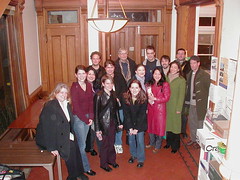(If you’re like me, you have a stack of partially read New Yorkers. I started thinking that I ostensibly subscribe mostly for the fiction, yet I only read the story sometimes. I hope this is the beginning of a weekly feature that will force me to read the story and respond to it. Maybe it will also spark discussion of current short stories. These are not meant to be reviews: there's no plot summary, and it’s assumed you have read the story and are ready to think about it. Don’t bother reading this until you read the story. I'm putting in stoplight icons, because not every story will be good ...)
Motifs:
- Breakfast food (pancakes, donuts)
- Gaining/losing weight (Mr. Kurumizawa)
- Stiletto heels (compared to weapons)
- Zen Buddhism (father-in-law, old man’s “reverse” Descartes [if you don’t think, you don’t exist] compared to Zen koan, investigator-narrator’s method of closing his eyes during which time disappears)
Is the mirror the door? The little girl points out about the mirror that “of all the mirrors in the staircase, this one reflects the best. It’s not at all like the mirror in our apartment.” When the investigator looks, “sure enough, the image of me reflected in the mirror was a few degrees removed from what I was used to seeing. The me in the mirror looked plumper and happier. As if I’d just polished off a stack of hot pancakes.” Is this what Mr. Kurumizawa saw? Did he go through the mirror? He was gone for 20 days and lost 20 pounds. He uses the stairs instead of the elevator in the first place because he’s put on weight. So his disappearance achieves what the stairs didn’t?
The little girl says it might not be a door he’s looking for. It might be an umbrella. Umbrella ... recall that it was raining the night Kurumizawa’s father, the Buddhist priest, was killed by the streetcar (sparking the panic attacks in the priest’s wife), and it was raining the morning Kurumizawa vanished -- because of the rain, his golf game was cancelled and he went down to help his mother through the panic attack.
As for religion, the narrator says he has no interest, but the tone of the piece says otherwise, or at least that he’s interested in the mysterious and the philosophical. Is he hiding something? Why does he work for free? Does he work for himself or for an organization? Did he have someone in his life who disappeared, and is that why he does this? He says he’s not married. Anymore?
The old guy says he’s seen Mr. Kurumizawa “staring off into space” from the sofa. The investigator notes that directly across from the sofa is the mirror. The old man goes on to speculate, “contrary to Descartes ... sometimes we think in order not to be. Staring into space might unintentionally actually have the opposite effect.” He also says, “...water always picks the shortest route to flow down. Sometimes, though, the shortest route is actually formed by the water. The human thought process is a lot like that.” So Kurumizawa may have thought himself out of existence? Is this what the narrator is trying to do when he closes his eyes and blanks out his mind? Is he looking for “the door” not so much to find missing people but so that he, too, can disappear? His ruminations to the ceiling at Kurumizawa’s return -- “Welcome back ... to the three sides of your beautiful triangular world --- your panic-attack-prone mother, your wife, with her icepick heels, and good old Merrill Lynch.” Stilletto heels related to those sharp pencils he’s so obsessed with?
And the pancakes and donuts. The stock broker husband called her on his way back up the stairs to ask that she get started on the pancakes he wanted, because he was hungry. He never got to eat those pancakes -- instead he disappeared for 20 days and lost 20 pounds. (It sure made the narrator want some pancakes, enough to consider walking to Denny’s (there’s a Denny’s in Tokyo?!) Stock broker’s memory gone. Does the narrator want to lose his memory? If so, I can find few clues to what is bothering him, if anything.
I don’t know if this story works only because it’s Japanese, and we forgive non-Western departure from our accustomed narrative conventions, or if it works at all, really. If it does, it’s because of some elusive fairy-tale, dream logic that involves fitting these motifs together in a way that I can’t quite manage but am enjoying trying to. Regardless of all this, I liked the story, but I think we need Freud -- or somebody besides Fox Mulder-san -- on this case.
